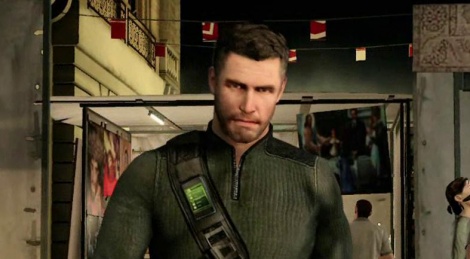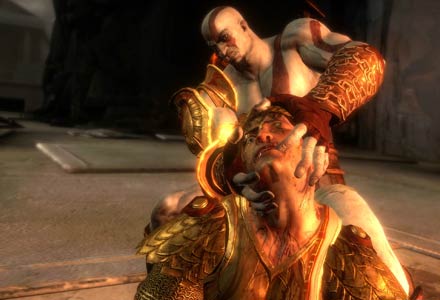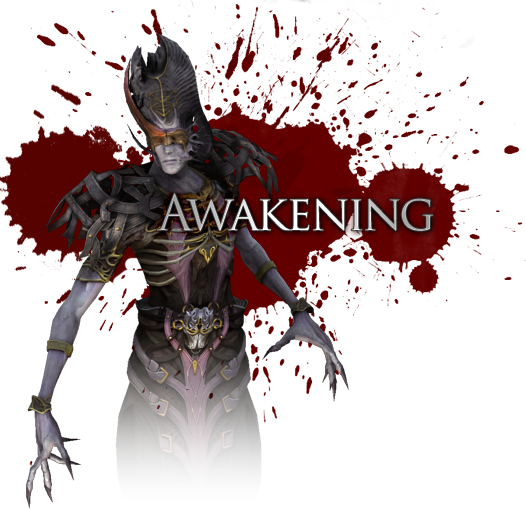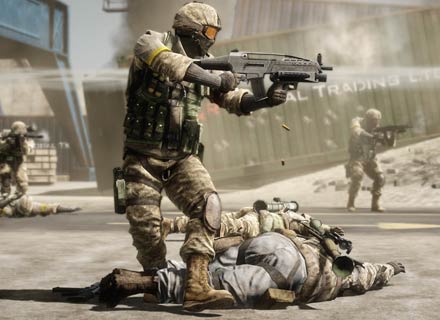I don't know why this review ended up being as long as it is, but here you are:
Watch out, I'm going to start this review with an anecdote.
For father-son bonding time, my dad and I always watch action movies. We're not particularly outdoorsy, so sitting on the couch watching Die Hard is much preferred to a fishing trip. One thing we've noticed over the years is that in each of the classic action movies, the hero is given the license to kill because their child is kidnapped, or their wife's been murdered or what have you. The hero's subsequent rampage is justified because someone messed with his family.
And that's exactly the plot archetype that Splinter Cell: Conviction follows. When talk of his daughter's supposed death seems to resurface, Sam Fisher decides he's tired of hiding, and the people who have betrayed him - the very same people who have ordered him around throughout his career as Splinter Cell - are all going to pay.
While that doesn't sound particularly original, it's certainly entertaining. The plot unfolds more like an episode of 24 than a plodding Tom Clancy novel. Twists abound, and people aren't always who they seem to be. The plot also gives some very interesting insight into Sam Fisher's character, as the silent badass becomes more human. You really get a sense of who, and what he's fighting for, and it's a real treat toward the end-game when his philosophies on revenge, duty, and trust really come to the surface.
The campaign is short - five hours short - but it's very fun, and even finds some strength in it's brevity. After a brief introductory sequence in Malta, Sam spends the rest of his time lurking around Washington, D.C., visiting various locations to unravel a treasonous conspiracy.
Perhaps "lurking" isn't the right word, though. Stealth elements in Conviction have been stripped down to the essentials, crouching in shadows, and watching enemy patrols for the right time. Beyond that, Splinter Cell plays more like an action game with an emphasis on keeping to the shadows. Players can swiftly take down enemies with the push of a button, and if things get out of hand, they're armed to the teeth, or if they're a bit more sneaky, they can make a quick getaway with one of the new gadgets.
Thankfully, even with the absence of some of the older features, Ubisoft has added in quite a few awesome new gameplay mechanics. The first, and most important is Mark and Execute. The player can pick out a number of enemies, and with the tap of a button, quickly dispatch them all, making it easy to get passed overwhelming patrols. But, it's not like it's a win button either, you have to get a melee kill to charge up your Mark and Execute meter, which pretty much perfectly balances out the new mechanic. The second notable new feature is Last Known Position. Upon being spotted, a silhouette of Sam will appear so you can tell where the guards thought you were last. This makes it easier to escape, or even set up an ambush.
There are some spots that change up the formula, and they can be quite entertaining. Chasing a conspirator around the Washington Monument, and, in a throwback to the old style of Splinter Cells, a sequence where you have to maneuver around an environment completely undetected. There are some pretty superb moments beyond that which I won't spoil, but there are some moments which don't work as well. Interrogations are brutally satisfying, but they serve to slow things down quite a bit, and are little more than slightly interactive cut-scenes.
The campaign is quite good as long as you're not expecting a lengthy adventure. The game has changed, Sam Fisher has changed, and in most part, it's for the better.
A Co-Op campaign was disappointingly absent from Splinter Cell: Double Agent, a letdown indeed after its memorable debut in Chaos Theory. Co-Op is back in full force in Conviction, however, in the form of The Prologue, which might just be the best of Splinter Cell: Conviction's three main pillars of game modes.

The Prologue doesn't have as much of an emphasis on story, but it does rather well in leading up to Sam's rampage as seen in the Campaign, and the character development is actually pretty great. Archer, a Third Echelon agent, and Kestrel, a Russian agent working for Voron (an international Third Echelon equivalent) must form an alliance to track down some stolen weaponry. Oh, and there's an awesome twist ending.
In terms of the gameplay, things remain pretty much the same as in the Campaign, however, working together on coordinated strikes against guards is a lot of fun, and, as mentioned before, co-op Mark and Executes are pretty insane, allowing you to clear out quite a few guards with a little bit of team work.
The Co-Op in Conviction is tons of fun, and in my opinion, the best mode the game has to offer. The story is well told, if simple, and the gameplay really lends itself to a co-op experience.
Deniable Ops is the last piece of the Conviction equation, and it doesn't totally stack up to the rest of the game's offerings. It's essentially a quick-play mode for one or two players in which an objective must be completed on one of the maps from the Prologue (as well as one additional one exclusive to Deniable Ops). There's Hunter, in which players must take down a certain number of enemies, Last Stand, where they must defend an EMP against waves of attackers, Infiltration, which requires players to take down guards without being detected, and Stand Off, Conviction's only adversarial multiplayer mode.
Of these, Hunter is the only one that really works, since the core gameplay (as in guard-killing fun) holds up just fine. Last Stand and Infiltration don't work as well because they require either all-out gunplay, or total stealth respectively, which goes against the game's natural balance of the two. Stand Off is a simple spy vs. spy deathwatch, the twist being that A.I. guards litter the map. For the most part, it works pretty well, but it's nothing outstanding.
While it's disappointing that there's no Spies vs. Mercenaries mode, Deniable Ops does the trick when it comes to quick, pick-up-and-play Splinter Cell action, just don't expect anything deep.

Campaign, Prologue, and Deniable Ops are held together by PEC Challenges, which can be completed across any of the game modes. The challenges range from simply escaping from a heated situation, to more whacky stuff like killing a guard by throwing another guard at him. These challenges award points which can be used for upgrading weapons and gadgets (for use across all game modes), and uniforms (only usable in Deniable Ops). These challenges actually offer a decent incentive for replay value, and outfitting your gear quickly becomes addicting.
Conviction's production values aren't stellar, but they get the job done. The graphics run on the now-dated Unreal 2 engine, although it does well all things considered. Lighting effects continue to impress, and the art-st.yle is quite good (especially noteworthy is the projected text), however, close inspection of pretty much anything in the game will reveal how low-tech it is. The sound department is decent, too. Voice acting is hit or miss, with Michael Ironside's gravelly Sam Fisher being a highlight, as always. The music is quite good, and really sets the tone for sneaking, or all-out confrontations. Sound effects can get repetitive, but for the most part the game does its job in looking, and sounding fine, but there's nothing amazing here.
From Conviction's Campaign, and Co-Op Campaign offerings, you're play time will probably clock in at around 12 hours, but Deniable Ops, and PEC Challenges can chew up a lot of time as well. The individual pieces of the package won't provide a whole lot of mileage, but combined, this game definitely has the replay value to justify a purchase.
Splinter Cell: Conviction is a very hit or miss game when it comes to everything from gameplay mechanics, to production values. The game is certainly not without its flaws, but the good ultimately outweighs the bad making Conviction a game worth checking out.










Log in to comment